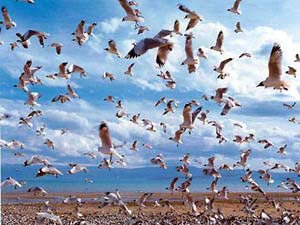Huge investment to improve environment of Qinghai Lake
Updated: 2008-01-04 20:59
XINING -- China plans to invest 1.567 billion yuan (US$214.7 million) over the next decade to protect and improve the ecological environment of the valley of Qinghai Lake, the country's biggest inland saltwater sea.
|
Qinghai Lake [file] |
Starting this year, the project will be carried out in Gangcha, Haiyan, Tianjun and Gonghe counties of Northwest China's Qinghai Province, covering 29,661 square kilometers, said a spokesman with the Agricultural and Animal Husbandry Economy Department of the Qinghai Provincial Development and Reform Commission.
The 10-year project aims to help conserve wetlands, restore grassland, control rats and pests, prevent land desertification, plant trees, resettle local residents, offer safe drinking water to rural people, renovate riverways, and others, the spokesman said.
"The project can not only help conserve the ecological environment of the Qinghai Lake valley and prevent the falling of the lake's water level, but also improve the living condition of local farmers and herdsmen," he said.
Perched more than 3,200 meters above sea level, the 4,300-square-km Qinghai Lake, located in the northeast of Qinghai-Tibet Plateau, is home to 189 species of birds and a crucial barrier against the desert spreading from west to east. With a slim population of more than 70,000, the Qinghai Lake valley is historically a land for farming.
|
|||
In addition, the lake is threatened by global warming and encroaching desert. Statistics with the provincial environment protection administration show the lake shrunk more than 380 sq km between 1959 and 2006 and the average water level dropped three meters to the present level of 18 meters.
More than 111,800 hectares of land around the lake has been suffering from desertification brought about by overgrazing around the lake and global warming, according to the provincial forestry department.
To curb ecological degeneration on the lake, China has invested 470 million yuan in recovering the plants around the lake and dealing with desertification. Local government has also banned fishing in the lake since 1982.
|
|
|
||
|
||
|
|
|
|



